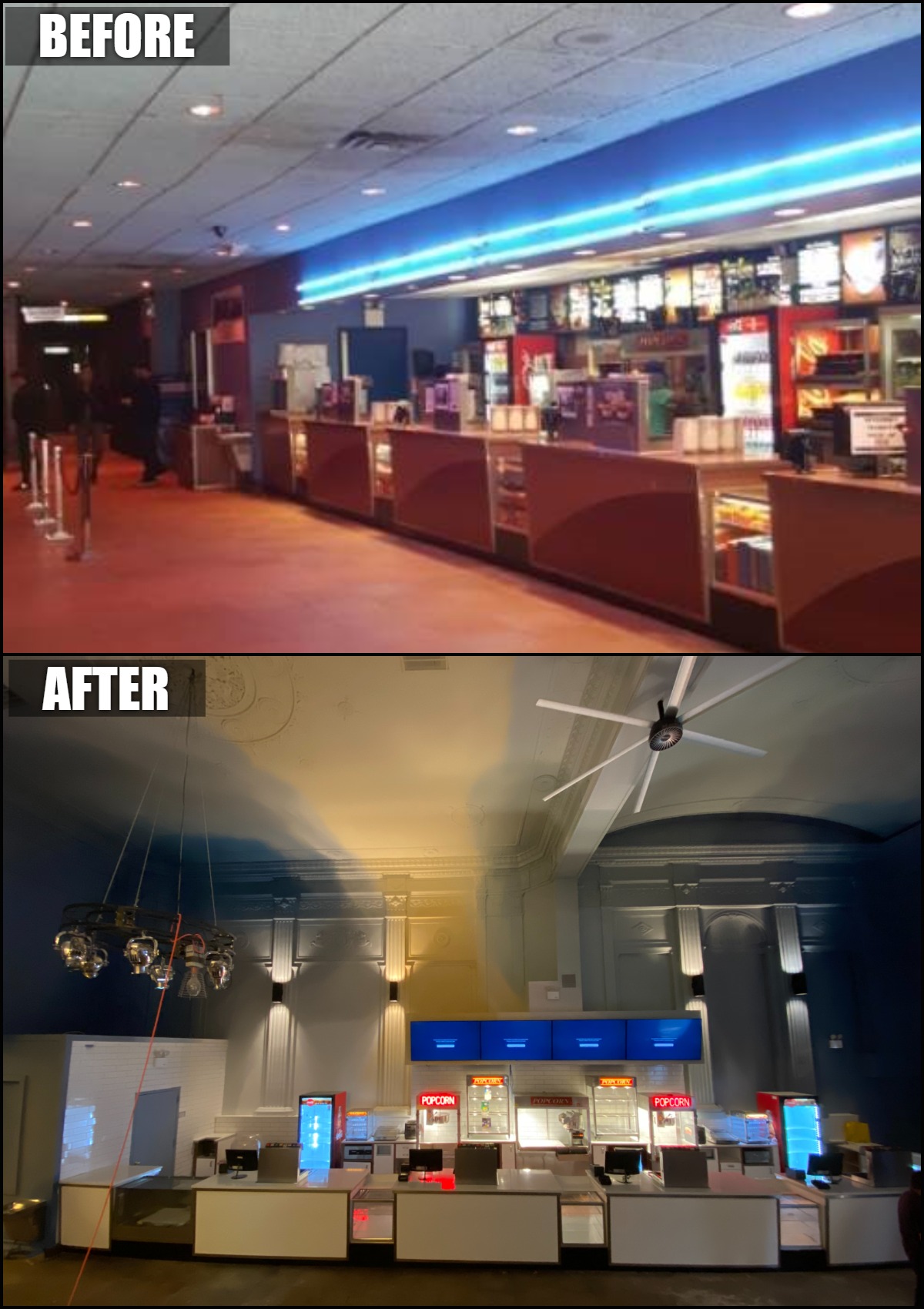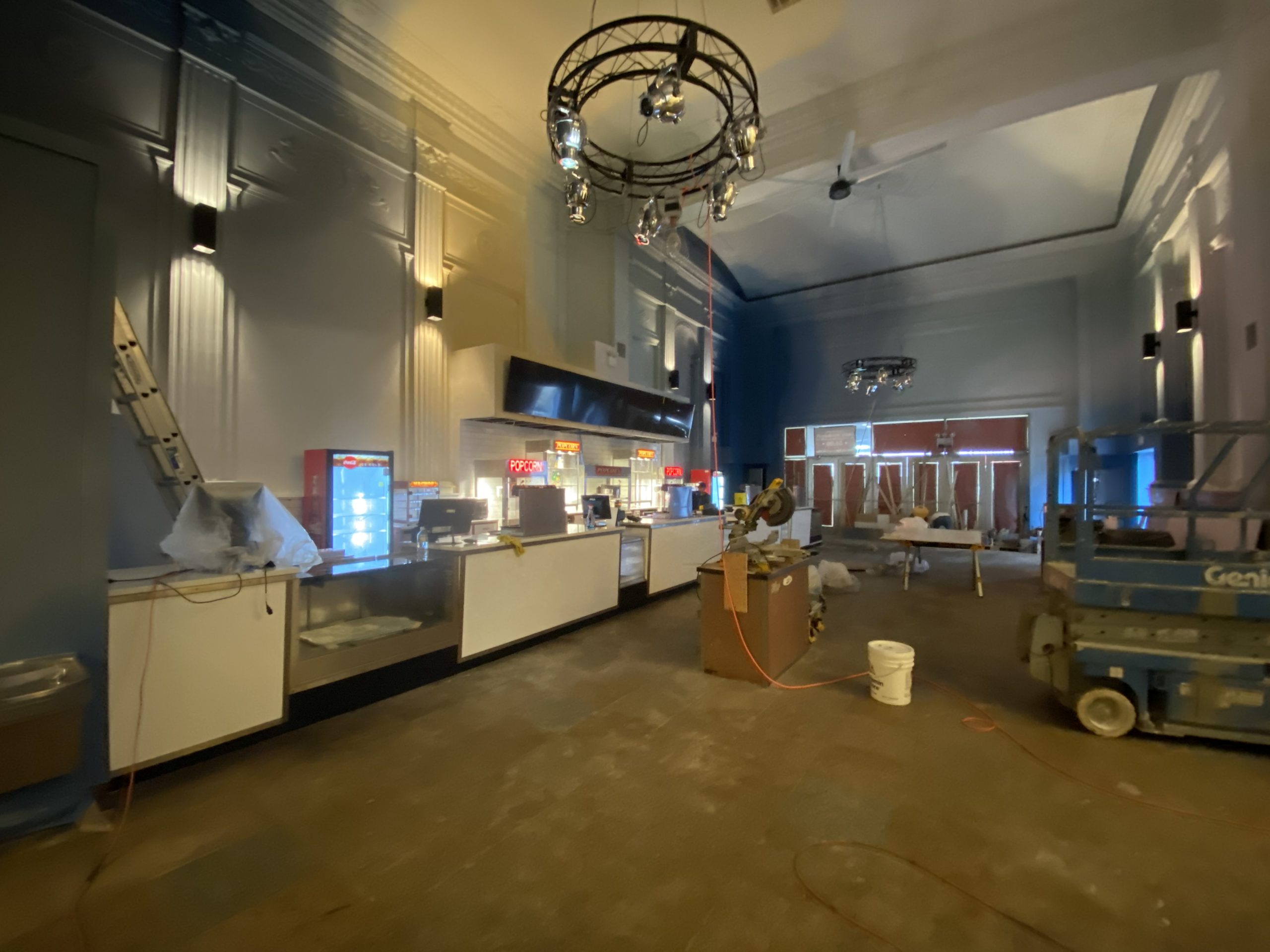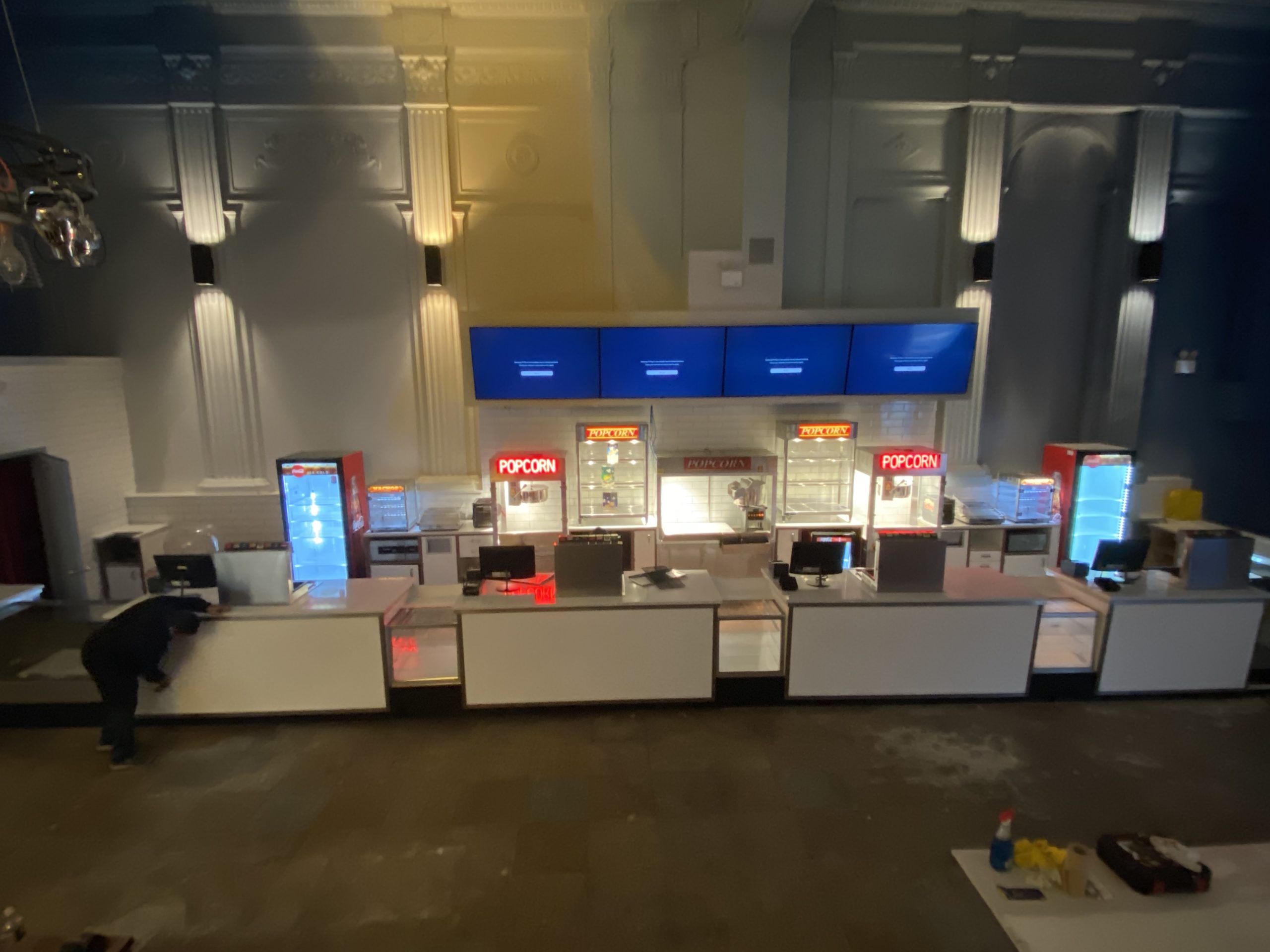There are only a handful of independent movie theaters left in New York City and Nicolas “Nick” Nicolaou owns four of them. The Alpine Cinema in Bay Ridge (the oldest movie theater in New York), the Cinemart in Forest Hills, the Cinema Village in Manhattan (known for showing smaller, indie films) and 711 Kings Highway (better known last remaining porn theater in the City) over in southern Brooklyn.
During the pandemic, Mr. Nicolaou was crushed as all his locations had to stay closed while the City kept charging him over $300,000 in property taxes. But rather than to throw in the towel and join his family overseas, he stayed in New York and made himself busy: he got his crew together and managed to renovate the hundred-year-old Alpine and sell off 711 Kings Highway, which he calls an “eyesore”, to a local Orthodox Jew.
We talked to him about that and more in a wide-ranging interview found below:
Rerelease News (RN): I want to start with the Alpine in Bay Ridge. From what I understand you were doing some upgrades there over the pandemic. Is this the first time you are renovating it since 2006?
Nicolas “Nick” Nicolaou (NN): In 2006, the theater was described by the Democratic Congressman and the Republican State Senator as a theater in despair. The theater was in very bad condition, and that’s why the theater was shutting down. When I saw that nobody would take that theater, I was with my kids and wife that live overseas, I took the plane and within a week or half the theater reopened.
I was committed because I thought I was doing a good thing for New Yorkers. I was convinced that the Department of Finance would hold off to their very aggressive increases on the property taxes so we would have the money to fix the theater. The property taxes are a big deal. It was then $120,000 and I asked them to curb them.
Obviously the Department of Finance took the easy way out, just kept raising the prices and strangled us. Within a short time we were paying over $300,000 in property tax. So, I really felt there was an injustice there by people who don’t understand economics in my book and they don’t understand cultural value in my book. So I kind of stopped putting in hard work and money into it.
Where I know, this city is giving out hundreds of thousands of dollars to some so-called nonprofit theaters, or this and that. I don’t want to go into it now. Because that’s all good. I don’t want to sound like I’m against what the City is doing. But I think what they’ve done to me for 14 years was a disgrace and no one came to help us with this.
RN: I think you are paying $330,000 just for the Alpine.
NN: Yeah, which is outrageous by any standards. We don’t mind paying fair taxation. But this is not fair taxation. And I’m not even gonna ask these people to take in consideration to have any respect for New York City’s history.
But I don’t think it’s fair taxation to pay this enormous amount of money that we had to pay during a pandemic when we were shut down with zero income. This should be corrected. Someone at the Department of Finance should look into it, and I’m hoping even some politicians would really take [this] in consideration. Not to do us a favor, but charge us something that’s fair. You can check, it’s a matter of record. What were my neighbors paying as property tax on Fifth Avenue. This is Fifth Avenue, Bay Ridge, Brooklyn. Not Fifth Avenue, Manhattan.
RN: And I think you pay less in Queens. You pay $161,000 in Queens and $63,000 Manhattan.
NN: Even for Queens, that is the wrong amount. It is partly the city’s property tax fault, that all these neighborhood movie theaters have shut down. I’m not saying it is their fault, but it is partly their fault. I have closed other theaters because of it. Because this also forces the rents to go up. Even if you go to rent the theater, the landlord tells you “That’s $300,000, $200,000 in property tax. I need half a million to rent this theater.” So that’s why New York City has lost all these neighborhood movie theaters.
Now, we’re only a handful of theaters left. And they continue the same way, like nothing is happening. Like it does not mean anything to maintain strong theaters in the neighborhoods, with no parking. But however, we still gather 600,000 people a year to walk to that theater and support the theater. In return, the theater pays hundreds of thousands of dollars in taxes every year. You’ve rejuvenated the whole immediate area. So the pizza guy down the street, the comic store next door, the pharmacy store, on the other side, the coffee shop, all these guys.
The magnet of the immediate neighborhood is the movie theater that brings in a half million, 600,000, 800,000 people a year. If somebody wants to understand the economics of it. These accountants may not see the cultural benefit. That all these teenagers after school, instead of hanging around on the corners, they’ll come to the movie theater. And that’s what Alpine is all about.
But look at even just the financial benefits and do the math before you strangle businesses that are magnets in maintaining not only our history, but our neighborhoods.
Even though my wife and kids live in a remote place overseas, during the pandemic I was here every day in New York. And I didn’t desert New York and I certainly had the means to do it. Because I feel New York is suffering, we should be here every day and feel the pain every day and feel the heartbeat of the city. You cannot do that if you’re in Cancún or some place in Europe or some island, waiting for this to blow over. This is not what I’m made of and I certainly could have done that. But I was here with my guys. If I ask my guys to go in, and repair the leaks we had and the problems we had, because it is a 100-year-old building, then I should be here with them and do what I can and walk them through.
So when the pandemic came, my conscience didn’t sit right to keep that theater in the condition it was in. Even though I’ve made improvements with what I could, I just didn’t have it in me and I started doing the work myself with a couple of guys. We certainly had plenty of time to be able to bring to the people, at least, a very nice and clean theater. So my conscience is clear.
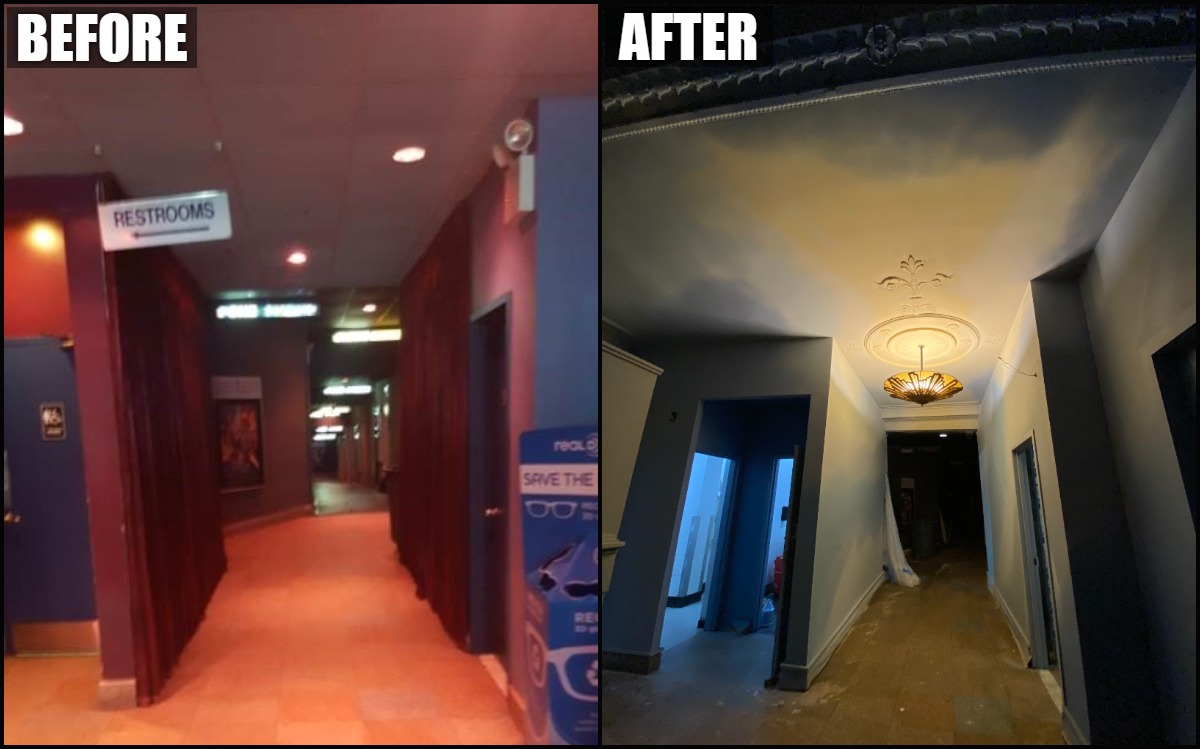
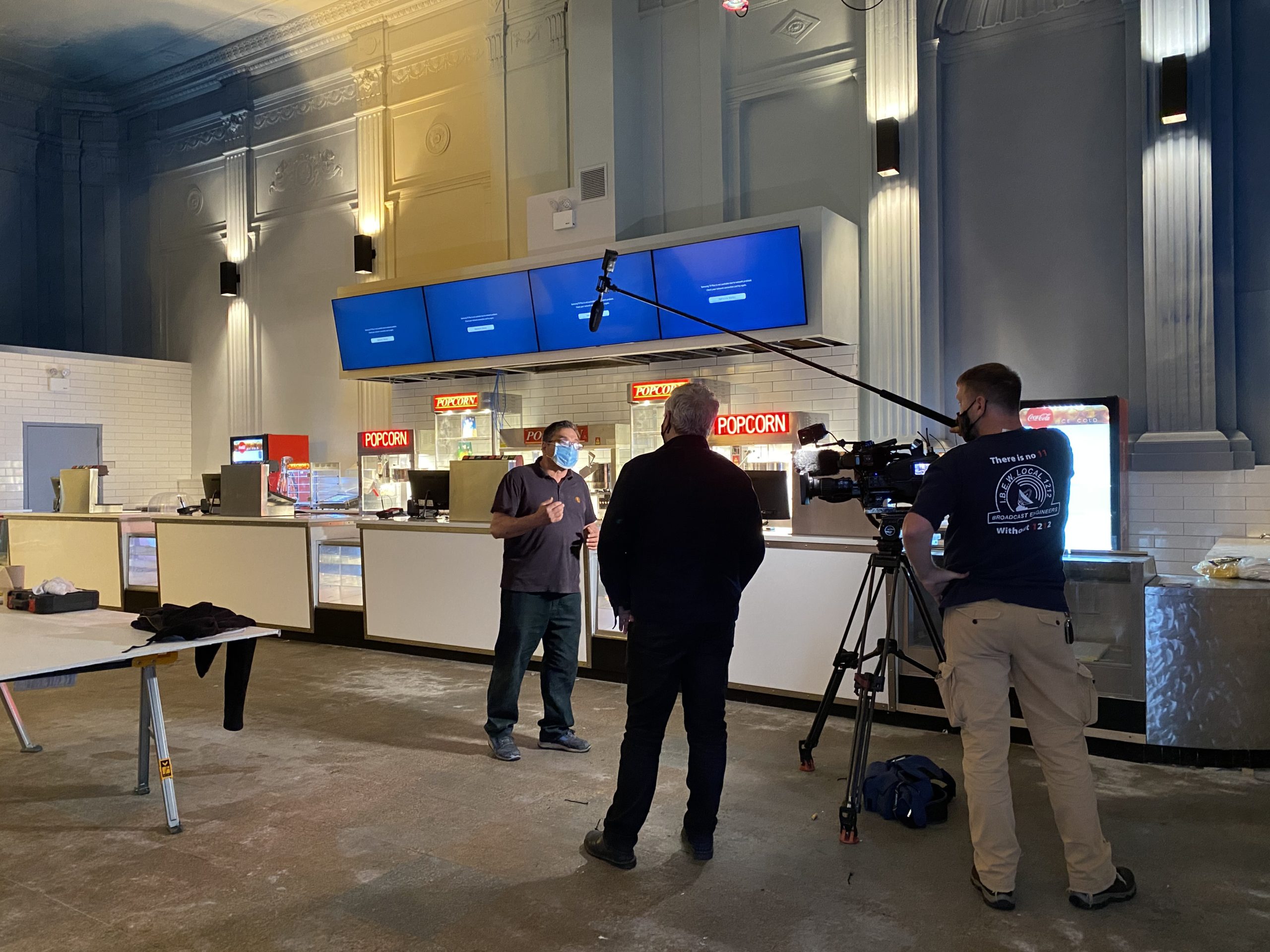
RN: You mentioned it was 600,000 people who went to the Alpine?
NN: Every year. Ask the guys next door how much money they make when the theater is closed. They’re making $30, $40, $50 or $100 a day.
They should give us incentives to stay in neighborhoods. Because if you add everything up, even if they just do the dollars, they should know by now. I’m sure they don’t and I’m always convinced they don’t give a shit on top of it. But we are New Yorkers, and we should speak up. Because I’m sure somebody cares. I’m sure somebody can do the math. I know who can do the math but he’s a little too busy now. And I will tell you later on who can do the math and who proved he can do the math.
RN: You mentioned nonprofits. Do you think if you would change to a nonprofit it would be easier for you to survive?
NN: I will not to that. I had the opportunity to become a nonprofit in Manhattan. What is a nonprofit? I’m a businessman. I don’t think it’s for me to debate whether profit or nonprofit is good or not good. I think there are good things about nonprofits but it’s not for me.
RN: You mentioned the Department of Finance but I think you also mentioned someone who can do the numbers. Who were you talking about?
NN: As the time went by, two months, three months, four months, where things didn’t go right with the pandemic, the longer we stayed closed and had to pay this money. At some point, our money ran out. In the meantime, we’re trying to talk to our bank. The banks gave us their encouragement for months. And then they would go and say “The Committee didn’t approve it because you’re a closed business and we don’t know what’s going to happen when you reopen. How strong the business will come back. So we can’t loan you any money.”
And then things started to get rough by October, November. The money was really going down. By December we didn’t have money to continue with what we’re doing.
And the Governor did the right thing to shut us down during such a pandemic, he needed to get a hold of what was going on. But towards October, November, December I was in a coma because you’ve exhausted all your funds, you’re still paying property tax and if you didn’t pay you had to pay a penalty on top of that.
Not to mention the damn sharks with millions behind them, calling you everyday and telling you “You know, you have to sell now. We can give you $2 million, $3 million.” All these bad people that took advantage during the pandemic of all these mom-and-pop businesses that had to pay property tax, that had to fix damages.
I came back to life when I heard that our own Senator Schumer was championing a bipartisan bill. He and his staff worked tirelessly to help the industry in general, meaning “Save our Stages” and “Save our Cinemas”. He was working hard to get us the money to get through the pandemic so we don’t sell our businesses. So we don’t go for the pressure of these greedy real estate people bugging you day and night.
He deserves all the respect. Every time all these people go to a Broadway show or they go to a night venue or a live venue or music event or they go to a movie theater in their neighborhood, we should all remember [Schumer] and his office and all those people who voted for this bipartisan bill. Nothing else before made any sense or any difference.
RN: We talked about three of your theaters but from what I understand you own four. I want to ask you about a theater you don’t talk that much about, it’s 711 Kings Highway.
NN: Yes, sure. That theater in the 60s, somebody I didn’t even meet but I knew a little bit, he had the theater. When adult movies were very profitable in New York, he turned it into an adult theater. And then he died with a heart attack.
He left it to his wife and his wife ran the movie theater for a couple of years. I was never in that area and she called me up and she says “Nick, can you take this over for me?” and I say “Who is running the theater?” and she says “Right now it’s just me and my two daughters.” I say “What are you, crazy? Why are you doing that? In that kind of a theater, you have your daughters?”
So I worked out a deal with that lady. And I had somebody who was interested to run the place for me, so I took it over. And the guy was running it. Now, that area there is a very lively, Jewish area. So through the years I check with my architect if we can buy the diner [next door] and make it a neighborhood theater again. It was impossible to buy the diner and the theater is too small.
So I did the next best thing. There is somebody that I know that lives right in the back of the theater and I sold it to him. I’m in contract with him now.

RN: And do you know if he’s going to keep it the same type of theater?
NN: No. He’s an Orthodox Jew. Are you kidding me? I told him, if I sell it I’m going to sell it to you guys or a Syrian Jewish guy, a friend I have. Because I feel the theater, the property should be sold to the people who live there.
And I had the same offer from three different people, even a little more money. But I sold it to the guy who lives there, a religious guy. And he’s just happy to buy it because it’s a good thing to get rid of the theater and put something lively that does good to the neighborhood.
I would have closed it much earlier but these guys sometimes… I closed it for a little bit some years ago and then they wanted to buy it for nothing. They started lowballing me. Until they got to know me. I told them, “Listen, I’m not asking you anything above price. All I want is a fair price. And all you want to do is take advantage and make your neighborhood better. Do it the right way. And I will take what you offer me. I am not asking you 100,000 or 200,000 more. I am not that kind of a guy. But don’t lowball me.”
So when the place was closed they tried to lowball me. So I said, “I’m not talking to you guys. When you come to your senses, make me a fair offer. Because I know you will do the right thing for the neighborhood, but make me a fair offer.”
So that’s what they did. When they made me a right offer, then I gave to [the buyer].
RN: And do you know what he’s going to do with it?
NN: I trust that he’s going to do something good for the neighborhood. Listen, if an Orthodox Jewish guy doesn’t do the right thing… See I don’t ask him because I don’t bargain with this guy. I know him for years. I’m not gonna bargain for him. He’s a little shrewd sometimes. If I ask him “What you’re going to do?” before we make a deal, it’s like I’m feeling him out to get another 100,000 or 200,000.
So now that he signed the deal, he made a deposit. I’m going to tell him, “Listen, there are these doctors around the corner. They wanted to buy it. But it was four of them and they wanted a full floor. It took too long between the doctors to figure out what they want to do so I wasn’t going to wait for them. So talk to them. And then there is a Jewish school for kids with down syndrome that wanted space in there. And they were willing to buy it. So and then there is another guy but I didn’t talk to him recently. He wanted to make a large kosher restaurant.”
So there is no restriction. The guy can do whatever he likes. The closing didn’t happen yet, but we’re in contract now. He signed the contract and made the deposit. I told him I’m not going to sell to a non-Jewish guy and I’m not going to sell to any Jewish guy because it has to be [someone] from around the area.
I tried at one point to make a nice family theater but it just doesn’t work, it’s too small.
RN: Back when you were running it, I think it was $12 for admission. Were people actually going? Did it make money?
NN: No. At one point we were going to close it when our architect told me “Nick, you can’t get nice-sized theaters there. It’s like going backwards in the 70s. Now we’re in 20-something. You’d be wasting and not making nice theaters.”
But I still feel, when I closed it for a while and I told my guy “It doesn’t pay, just keep it closed”, all those people that I knew wanted to buy it for dirt cheap. Because “Oh, he’s out of business”.
I kept it running in the most respectful way without provoking anything or putting any signs in front. That’s the instruction that my operator had, to operate the place quietly. Don’t encourage it in any way, don’t put anything. It’s vulgar to put pictures and anything like that. There’s kids passing by and all that.
We got along with everybody in the neighborhood. Even the guys next door, Jacky with the pizza place and all that. We get along with everybody but I’m sure the people would rather have something else there. And that’s what it deserves. We knew it. We just wanted these guys to give us a fair price.
The other guys tried to lowball, so I didn’t answer them. Then they all come and want to pay what this guy paid. Because it was a fair offer for both sides.
RN: Even the pizza store didn’t mind?
NN: I’m sure they didn’t like it. But we were always in the pizza place. We talked to the guy. Jacky, we knew him for years. He’s got good pizza over there.
Of course it’s better if that place is not there. First of all, it’s a good block. It’s not even that it provokes anyone but it’s an eyesore and it deserves to go.
That’s why I was very careful. Three years ago I let my guys stay there for no rent. Maybe even longer, time goes fast after you’re 60. For a long time I said “You pay no rent, just keep it quietly for a few hours and we’ll sell it.”
The good thing is that we sold it to the right person. And we could have held on to it, it’s no problem. But what’s the purpose? There’s no purpose in holding on to something. Because if I could build something and rent it out as a store, I rather somebody does it that has a feel for the neighborhood. That cares for that neighborhood. To finally put something that make sense. So I’m happy that that’s been taken care off.
RN: I want to switch to your new documentary.
NN: The movie, if you google “The Projectionist” by Abel Ferrara, it played in many countries. And it played this year and these past few months during the pandemic, it played from Canada to Berlin, Italy, all over the United States in small art theaters. It must have played it 40 or 50 theaters.
I met him in some film-related event. He wanted to make a movie about the cinema history situation. In the 70s, and 80s, and 90s, and all that. Then in the middle, Abel was telling me, “Nick, come down, I want to hear from you about this.” It’s the filmmaker’s film. Afterwards, I realized he’s making [the documentary]. He’s like, I’ll be the main issue. You don’t know when you make a film with Ferrara what he’s doing.
RN: Is there anything else you want to say about any of the things about what you’re doing in Bay Ridge with your Alpine or about anything else that I didn’t ask?
NN: I think everyone will be pleasantly surprised that there are good improvements to make the place what I should have done 14 years ago. We have a good manager there. A hands-on guy from the neighborhood. We’re going to try to make it better.
There’s always room for improvement but we want to make it better because we feel strongly that these few neighborhood theatres that are left, especially the ones that are 80, 90, 100 years, they mean something to those people who for generations visited them and came and spent some happy times in a movie theatre.
As long as I’m around, I want to keep these theatres going. For the first time after forty-something years, during the end of 2020 that was it, I was debating which one to sell to the sharks so I can save the other theatre. My mind was so confused. I said, “Great. I was always going to sell Kings because we don’t want to open that. Let me call up the guy that lives behind the theatre.” We didn’t have to sell any of the theatres that we really should keep.
RN: That’s great. And from what it looks like, you don’t plan on selling them?
After what we’ve been through the pandemic, I’m never going to say never again because it certainly came very close. In the end, if Senator Schumer did not, and along with other politicians– I apologize for not knowing their names. If he didn’t champion this thing, this relief bill to help us pull six, eight months, we were screwed. I was so convinced my bank was going to give me the loan and they let me down every time.
RN: I hope that once you reopen, it will be a success. The first I think is 25% capacity [per the New York State rules], but I think you wanted to put it up to 50% to make a profit?
NN: Yes, you definitely need 50% to make any profit. Believe me, I would’ve opened at 25%. I would have opened at 10%. Because to me, having the place open makes sense.
(This interview has been edited for brevity and clarity.)
